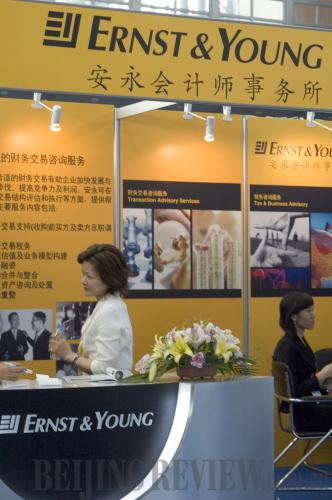|
 |
|
GLOBAL ACCOUNT: Ernst & Young provides information at the China International Private Equity Forum held in north China's Tianjin Municipality in June 2007 (CFP) |
The new local audit partners should also have a much deeper understanding of mainland culture and business practices, making them more effective than foreigners trying to audit in China, he claimed.
"All of KPMG's staff will actively respond to the program's requirements and be dedicated to a steady and smooth transformation of the Chinese-foreign joint venture accounting firm into a special group partnership," KPMG's China unit said in a statement.
PwC and Ernst & Young also supported the program. "The firm has been actively localizing its China practice by investing heavily in developing local talent and promoting local partners in past years," PwC said in an email to Global Times.
"Our business is well positioned for this transition," Ernst & Young said in a press release.
Late localization
On July 13 KMPG became the first of the big four to localize its operations and receive MOF approval to transform itself into a special general partnership enterprise from a Sino-foreign cooperative joint venture under contract, with a registered capital of 10 million yuan.
The four accounting firms entered the Chinese market in 1992, setting up joint ventures with local accounting firms.
The Sino-foreign cooperative contracts signed 20 years ago by KPMG, Deloitte and Ernst & Young will expire in August 2012, and PwC's joint venture will expire in 2017.
When the four entered other countries, they typically absorbed top local firms to establish a presence. But in China, Sino-foreign joint ventures were set up because the country's accounting sector was still in its infancy and unable to offer similar take-over opportunities.
"The cooperation between Chinese and foreign accounting firms was an innovation unique to China under special historical conditions," said Ma.
Currently, localization is already happening without the need for government mandates. In the big four in China, the proportion of local employees now reaches more than 90 percent, according to Caijing Magazine.
"Localization actually began to occur the day the major accounting firms entered China," said Sherry Hao, KPMG partner.
Since coming to China in 1992, KPMG's original staff of local graduates have moved up to become directors and key decision-makers. Also, with the promotion of local staff, the proportion of foreign staff gradually decreased, said Hao.
According to Caijing Magazine, most foreign staff members now are senior partners between 45 and 50 years old.
Localization is an inevitable practice, and the government's rules are only accelerating the process, said Deloitte Partner James Chen.
Imbalances
The practice that most of China's large state-owned enterprises have selected global accounting firms as their auditor with their key data exposed to the big four has posed threat to the security of the national economic information.
With the Chinese Government becoming more and more aware of state information security, localization of the big four is necessary, said Cai Jian, General Manager of the Jiangsu Gongxin Accounting Firm.
"Having its key economic information and enterprise data grasped in the hands of global firms makes China vulnerable in trade competition and poses a threat to its national security," Cai added.
In addition, the restructuring rules for the accounting firms to transform from joint ventures into special general partnerships will change legal liabilities for auditing risks.
According to Ma, since most foreign partners at Sino-foreign joint ventures are not CPAs, the local staff are forced to assume more responsibilities than they may have been qualified to.
"This is an imbalance of responsibility and power. Foreign partners are the real controllers and managers of the big four in China, but they do not assume the appropriate responsibilities," said Ma.
The new rules stipulate that accounting firm partners will be held liable for losses caused on their watch.
"It's a big change. For joint ventures, the legal liability is limited," Ma added.
In response to the MOF guidelines, the big four are busy preparing to have their practices restructured. Finding seasoned Chinese partners has proven challenging, said Gillis.
Under the new rules, by the end of this year the big four must meet the requirement that no more than 40 percent of their Chinese partners have gained their certified public accountant certification overseas. By 2017, that cap will drop to 20 percent, and a Chinese citizen must be picked to head each of the big four's operations in China.
"That is to say, we have to double our Chinese partners in five years. It is an arduous task since the promotion of partners needs a long time of experience and assessment," said David Wu.
| 